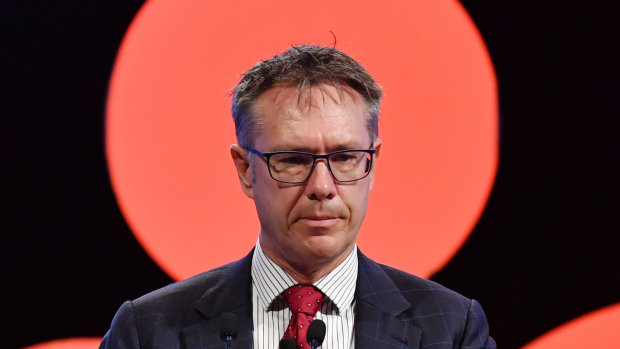Local bond market sources reported heavy selling pressure, an evaporation of liquidity and upward pressure on yields in global government borrowing markets, including the US and Australia.
“There are alarming liquidity signals and it’s very dark out there at the moment,” a bond market source said.
The 10-year Australian government bond yield had spiked to 0.96 per cent on Friday afternoon, from 0.77 per cent that morning and 0.66 per cent on Wednesday.
The yields rose due to sudden selling by offshore investors such as hedge funds which are scrambling to repatriate cash to their home markets and amid concerns the institutional investors may not be able to roll over their own borrowing.
Local banks and investment banks, known as market makers, are mopping up the federal government securities, a factor that is increasing their demand for short-term cash from the RBA.
As part of its usual daily operations the RBA injected $8.8 billion into the “repo” market on Friday morning, compared to the $3.74 billion original intended volume, in effect providing short-term cash to commercial bank counter parties.
Extra liquidity
Repurchase agreements are where commercial banks temporarily swap collateral such as bonds, commercial bank paper and residential mortgage backed securities (RMBS) in return for RBA cash.
The central bank also provided extra three-month liquidity, which it only occasionally does.
Traders welcomed the increase in the RBA’s open market operations activity after calling for larger liquidity injections earlier in the week.
Peter Sheehan of Curve Securities said there was important differences compared to the 2008 global financial crisis.
“There’s enough [money] to go around – it’s just a matter of whether people share,” he said.
As the Morrison government prepares to run deeper budget deficits to fund its $17.6 billion coronavirus stimulus, its debt management agency, the Australian Office of Financial Management will attempt to sell a $500 million bond expiring in 2032 to debt investors on Wednesday.
It will be a test for investor appetite for AAA-rated Australian government securities, but also provide an important opportunity for the AOFM to set “price discovery” in the market and send a signal that the government can fund itself in stressed market conditions.
Ahead of funding schedule
The government is ahead of its funding schedule and could afford to sit on the debt market sidelines for several weeks, while commercial banks could go without tapping long-term bond markets for three to six months, a senior banker said.
The three month Bank Bill Swap Rate increased 5 basis points to 0.62 per cent.
“There’s heavy selling of bank bill futures, a bit like the GFC,” a trader said.

RBA deputy governor Guy Debelle says an unconventional bond buying stimulus is “absolutely” under consideration as the central bank seeks to counter the economic hit caused by the coronavirus. AAP
After allowing for some of the RBA daily purchases rolling off, its net liquidity injection was about $7 billion.
Commercial bank treasury sources said liquidity had almost evaporated from credit markets.
QE on the cards?
The RBA is not directly buying government bonds, nor is it conducting so-called quantitative easing (QE), though there is speculation inside commercial banks this could happen soon.
QE would provide a new RBA buyer of bonds, creating new demand and helping ease liquidity problems.
Sources in the market said the industry superannuation fund cash desks were dealing with a large influx of transactions as they manage an influx of rebalancing and investment shifts from their members.
In the corporate debt markets, trading has all but tried up. One trader reported that a bond issued by A-rated US food giant McDonald’s was trading at 10 per cent discount to its face value.
The RBA’s largest repo tranche was $5.625 billion of funding on 95 day term at a weighted average of 0.66 percentage points.
The RBA also provided $610 million of 17 day repo funding at 0.80 percentage points, $2.6 billion of 27 day funding at 0.83 percentage points.
Those rates imply borrowers are prepared to pay a margin above the prevailing bank rate.
Dramatic change
The situation has abruptly changed since Wednesday when deputy government Guy Debelle said there had been a material increase in corporate debt spreads in global bond markets but not widespread disruption.
“My general sense from talking to participants around the world is that there has been more of a repricing story… rather than than a large selling story – not in every market,” he said on Wednesday.
At that stage the RBA had only slightly increased short-term lending to banks through its normal daily operations.
Unusually, US bond and equity markets both sold off on Thursday night. They typically move in opposite directions.


